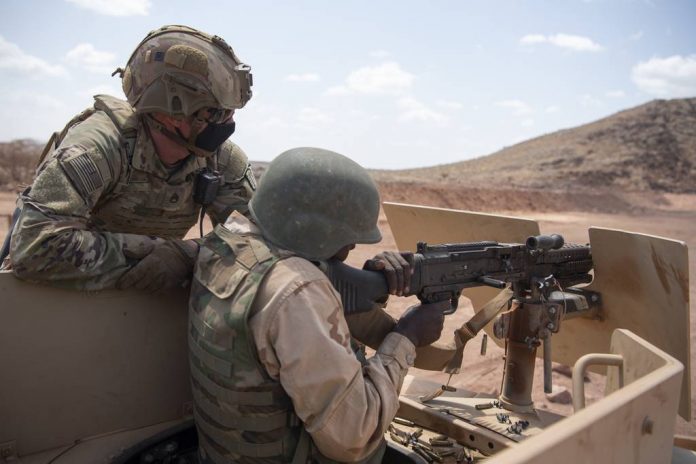US Army brigade in Africa seeks to ward off Chinese, Russian influence
The U.S. Army’s 2nd Security Force Assistance Brigade is training militaries throughout Africa to woo countries away from Chinese and Russian influence on the continent.
“As the Army refocuses on China — our pacing challenge — as well as the acute threat posed by Russia, it’s important to recognize that both countries are actively competing in Africa,” Maj. Gen. Todd Wasmund, the commander of Southern European Task Force, Africa, said Monday at the Association of the U.S. Army’s annual conference.
“China and Russia understand very well Africa’s strategic significance,“ he added. “They are seeking to influence events on the continent in their favor using political influence, disinformation, economic leverage and malign military activity. We also know that violent extremist organizations are a persistent threat.”
Wasmund’s remarks indicate how the brigade has turned largely toward great power competition as it bolsters U.S. military ties in Africa, similar to its counterpart — the 5th SFAB in the Indo-Pacific region — which often finds itself training Asian militaries alongside Chinese advisers.
The Army hopes the 2nd SFAB can ultimately help integrate African partners with NATO forces. But Chinese and Russian activities have complicated that task, Wasmund said, noting the Russian mercenary firm Wagner Group and its activities in Mali have made it hard for the U.S. to operate there.
Created in 2017, each of the five security force assistance brigades has 800 troops; they’re focused on training foreign military counterparts so as to allow conventional and special operations forces to zero in on their primary missions. Each SFAB mission consists of four to 12 specialized U.S. service members.
Since the 2nd SFAB deployed to Africa in 2020, the brigade has conducted activities in more than 15 countries across the continent with a regular presence in 11 of them.
That included a training mission in Ghana, where the 2nd SFAB enabled Ghanaian forces to shut down an illegal Chinese mining operation. Ghana had also requested the U.S. Embassy lend assistance to establish a school to prepare soldiers for United Nations peacekeeping missions on the continent. With assistance from the 2nd SFAB, Ghana ultimately developed the Army Peace Operations Training School.
In addition to Ghana, the 2nd SFAB has helped train militaries in Morocco, Tunisia, Senegal, Somalia, Djibouti, Senegal, Botswana and Zambia.
It has also assisted in the Afrian Lion military exercises, regularly hosted by Morocco, while also training the Tunisian military for combined arms, live-fire exercises and command post drills with the goal of integrating the country’s air, land, maritime and special operations forces and their U.S. counterparts.
The brigade is also on a consistent mission in Djibouti to help its armed forces develop a rapid intervention battalion with the goal of being able to quickly deploy to counter internal and regional threats. That mission began in fiscal 2019 and ends in fiscal 2024.
The 2nd SFAB has played a key role in training Djiboutian forces to use American military equipment purchased through the U.S. Foreign Military Sales process.
Col. Grant Fawcett, the 2nd SFAB commander, argued the brigade’s ability to “stay there over time and build a trusted relationship” marks a difference from “transactional or exploitative” relationships that African countries may have with China and Russia.
But Maj. Gen. Donn Hill, the head of Security Force Assistance Command, noted current doctrine “does not clearly define” the SFAB role in responding to a crisis or conflict — something he hopes to rectify in the near future.
























:quality(70)/s3.amazonaws.com/arc-authors/archetype/1d6dc8b3-1cb9-410c-86ae-3a83fc91d7d9.jpg) Bryant Harris is the Congress reporter for Defense News. He has covered U.S. foreign policy, national security, international affairs and politics in Washington since 2014. He has also written for Foreign Policy, Al-Monitor, Al Jazeera English and IPS News.
Bryant Harris is the Congress reporter for Defense News. He has covered U.S. foreign policy, national security, international affairs and politics in Washington since 2014. He has also written for Foreign Policy, Al-Monitor, Al Jazeera English and IPS News.





